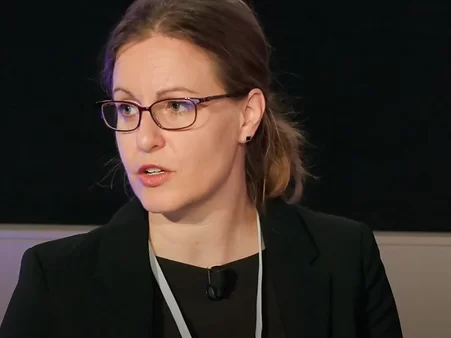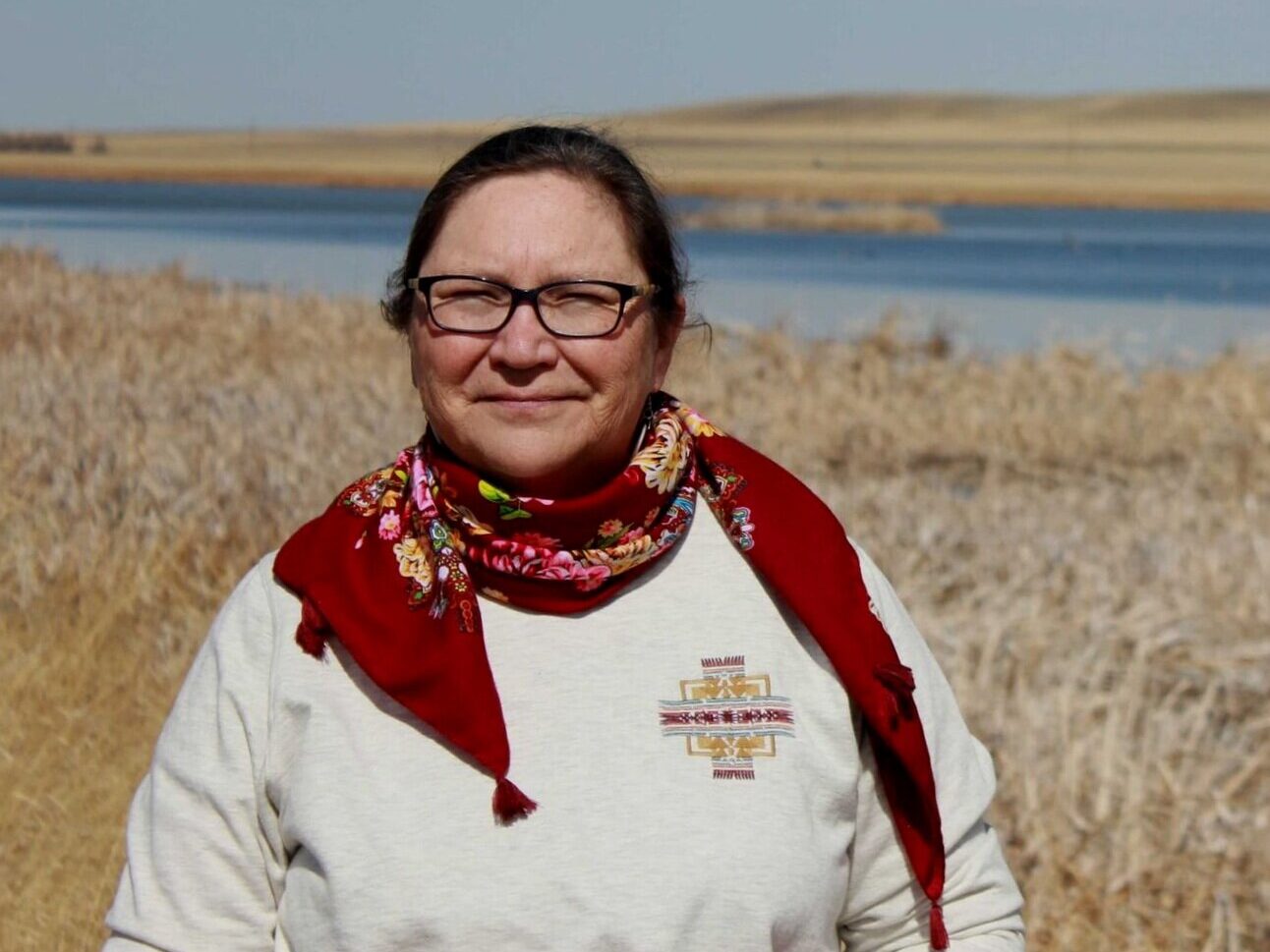Keynote Speakers

Dr. Jessica Zychowicz is the Director of Fulbright Ukraine & Institute of International Education, Kyiv Office. She is the author of the award-winning book Superfluous Women: Art, Feminism, and Revolution in Twenty-First Century Ukraine (U-Toronto Press 2020), editor of Freedom Taking Place: War, Women and Culture at the Intersection of Ukraine, Poland, and Belarus (Vernon Press 2023). She is also the author of numerous articles, chapters, and other texts. She was a U.S. Fulbright Scholar to Ukraine, a Research Fellow at U-Toronto Munk School of Global Affairs, a Visiting Scholar at U-Alberta, and a Visiting Scholar Uppsala University in Sweden. She holds a doctorate from the University of Michigan and BA from U.C. Berkeley. For more information: https://www.jes-zychowicz.com/

Dr. Rosalyn LaPier is an award winning Indigenous writer, environmental historian, and ethnobotanist. She/they work within Indigenous communities to revitalize traditional ecological knowledge (TEK) and to strengthen public policy for Indigenous languages. She/they are the author of Invisible Reality: Storytellers, Storytakers and the Supernatural World of the Blackfeet. Rosalyn is an enrolled member of the Blackfeet Tribe of Montana and Métis.
To learn more about Rosalyn, please see her personal website.
Panelists
Amy Achenbach is a PhD candidate in History at Baylor University in Waco, Texas. Her research explores the culture and “gender difference” ideology of single-sex, women’s spaces through the lens of collegiate, Greek-letter sororities. Rooting her analysis in their Progressive Era founding, she questions why these organizations not only survived but thrived into the long twentieth century.
Ganiyat Alli is a third-year Ph.D. student in History at the University of Illinois Urbana-Champaign, She specializes in the intersection of Islam, Women, Yorubaland, and Western Nigeria. She holds a Bachelor of Arts in History and International Studies from Lagos State University, Lagos, Nigeria, and a Master of Science in Peace and Development Studies from the University of Ilorin, Nigeria. Ganiyat’s research interests encompass the socio-political dynamics of these regions, particularly focusing on the role of women within Islamic societies. With a passion for uncovering the historical narratives of marginalized communities, she seeks to contribute valuable insights to the field of African historiography.
Arpita Biswas is a PhD student at the Women’s, Gender, and Sexuality Studies department at Rutgers University, New Brunswick. Her research interests include studies of nationalism, aesthetic theory, visual culture, and cartography, with a specific focus on “bodyscapes” / anthropomorphized and zoomorphic depictions of geobodies in South Asia.
Srinanda Ganguly is a PhD candidate in the Art History program at the School of Art and Design, UIUC and received her MPhil and MA from Jawaharlal Nehru University, New Delhi. She works on gender and Mughal funerary architecture, with a focus on three seventeenth century tombs at Khusrau Bagh, Allahabad, India.
Victoria Greene is a PhD Candidate in the department of History at Columbia University and a fellow in the department of Greek and Roman Art at The Metropolitan Museum of Art. Her research focuses on the ancient Greek world, primarily in the fifth century BCE, and explores topics of gender, slavery, and warfare. Her dissertation project sheds light on the experiences of women in the Peloponnesian War and examines gender as an axis of power in the late fifth century BCE polis landscape.
Rachel Hamilton is a second-year PhD student in the Department of History at Queen’s University (Canada), and studies nineteenth-century British history under the supervision of Dr. Sandra den Otter. Her current research considers individuals who intruded on Queen Victoria’s privacy, and who would today be called “stalkers.” Her work investigates the relationship between these intrusive actions and gender, mental illness, and real and imagined forms of intimacy. She also studies the ways these intrusions challenged and redefined the Victorian public’s relationship with the British monarchy.
Suyoung Kim is a History PhD student at the University of Pennsylvania. Her research investigates the transformation of women’s work, labor, and social space in the Japanese empire (1868–1947), namely Japan and colonial Korea. She is especially interested in the role of legal and illegal labor brokers and seeks to understand how they shaped women’s work participation and work migration in the early 20th century. Her previous research examined the writings of Japanese and Korean cafe waitresses in the empire and shed light on the “emotional” dimension of their labor.
Nathan Klembara (he/they) is a Ph.D. Candidate in Anthropology at Binghamton University. He is a broadly trained anthropologist who examines the structural inequalities present in the field of anthropological archaeology and how those inequalities influence the information we can know about the past. In particular, he is interested in queer narratives of deep prehistory, and he used both preserved art and burials/deathscapes from the Upper Paleolithic of Western Europe to demonstrate how a more just, nuanced, and epistemically rigorous understanding of prehistoric gender and identity can be attained through the intersection of queer theory and archaeology.
Maia Vitarini Lwin is a Richard J. Franke Fellow and PhD student in English and Women’s, Gender, and Sexuality Studies at Yale University. Oriented toward 20th- and 21st-century American literature and film, Maia’s research privileges queer affect, posthumanisms and animal studies, and reproduction. Maia previously completed a BA in English at the University of California, Berkeley.
Devi Nayar is a second-year Ph.D. student in the combined degree program of Architecture and Anthropology at Yale University. Prior to this, she received her Master’s degree in the Master of Environmental Design (MED) program from the Yale School of Architecture. Her research focuses on the anthropology of dwelling across the Indian Ocean network informed by material and cultural exchanges. She is also interested in everyday spatial practices at the intersection of space, gender and religion in the Middle Eastern and South Asian context. Prior to coming to Yale, she ran her own architectural practice and furniture design studio. She holds an undergraduate degree in Architecture from Visvesvaraya Technological University, India, and a Master of Science in Architecture from Tampere University of Technology, Finland.
Nesya Nelkin is a second-year PhD student in the Department of History at Columbia University. Her research focuses on late medieval Jewish women’s religious activities, with particular attention to women’s space in the synagogue complex and to rabbinic ideas about gendered spatial boundaries in Ashkenaz and northern Italy. She is interested in the relationship between variations in the physical forms of these boundaries and in communal conceptions of women’s ritual roles. She is also interested in women’s engagement with rabbinic courts.
Lance Pederson (he/him) is a Ph.D. student in the Department of History at the University of British Columbia. His research focuses on queerness, masculinity, and gender non-conformity in France from 1660-1815. He began his Ph.D. at the University of Illinois Urbana-Champaign before joining his advisor, Dr. Clare Haru Crowston, at the University of British Columbia.
Andres Restrepo-Sanchez is a Ph.D. student in Anthropology at the University of Iowa. His research interests include feminist approaches to care, masculinities, gender violence, and reproductive justice. He is currently working on a project that combines ethnographic and archival research to examine the experiences of obstetric violence in Medellin, Colombia, and their relation to longstanding legacies of violence in this city.
Saffron Sener is a second-year History PhD student at Harvard University. She is an environmental historian working on gender and lived religion in the early American West. She is also interested in visual and material culture, memory, and public history.
Faolan Thompson is a PhD student in History at the University of Pittsburgh, where they are focusing on intersections of childhood and environment in the United States in the nineteenth and twentieth centuries, with a specific focus on summer camps and immigrant families. They completed a master’s in Gender Studies at Charles University in Prague, where they focused on gendered approaches to science, nature, and culture in Australian history, and have carried an interest in transnational settler colonial structures of difference into their current work.
Reanne Zheng is a PhD candidate in History at the University of Illinois Urbana-Champaign, specializing in Asian American history. Her dissertation research explores the transimperial ties between the white and Chinese populations of Hong Kong and San Francisco’s Chinatown, tracing the ways that imperial practices travel across spaces and borders while maintaining foundations along racial and orientalist lines.